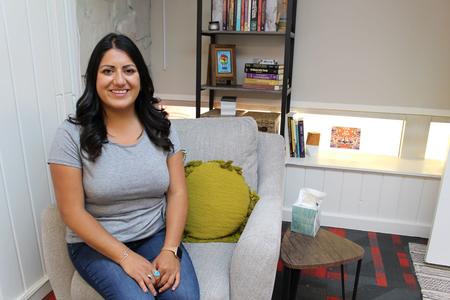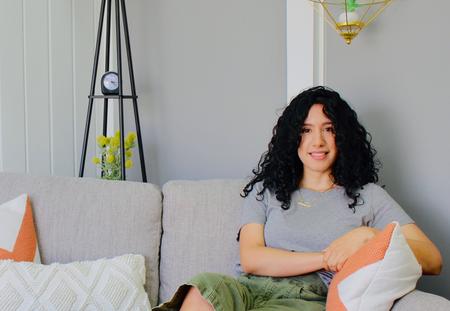July 20, 2021: July is Black, Indigenous and People of Color Mental Health Awareness Month. To learn more about culturally-responsive care, we spoke to Neva Martinez Ortega, MA, LPCC, and Anaisa Lua, MA, LPCC, two providers with Servicios de La Raza. Servicios de La Raza is an Office of Behavioral Health grantee and a Community Mental Health Clinic.
What inspired you to join the behavioral health field?
Neva Martinez Ortega: I once heard that for a fulfilling career, people often turn their pains into passion. When I heard this, I realized that this was the case for me. Growing up in a very close and large Latine family, mental health or illness was never a topic that was discussed or even understood. As a young teen, I lost two very close cousins to suicide, and my family began learning a lot about mental illness and what depression actually was and looked like in someone you love. This was a very hard lesson for my family and caused us all deep pain. In high school, I took my first Psychology class and was immediately hooked because I wanted so badly to understand more. I found my path at that time, and wanted to ensure that more people would have the tools they need to understand mental illness and receive good care.
Anaisa Lua: When I was younger, I had a strong interest in reading coming of age stories because of the intimate relationship you had with the main characters. The detailed insight into their thoughts, experiences, feelings and beliefs sparked curiosity, empathy and understanding in me. Therapy gives you an opportunity to see, experience and connect with others in ways that I privilege immensely. Intuitively, I knew I wanted to pursue a career where I could marry my curiosity with intimate human experiences and thoughts with my desire to create spaces where others felt understood, seen for who they truly are and feel accepted in that state of rawness.
What does "culturally-responsive care" mean to you? Can you share an example or moment that captures it for you?
NMO: Starting my education in psychology, I found out quickly that culture was discussed briefly in one lecture or was the last chapter of a textbook. To me, culture encompasses all aspects of what makes you, you, and I couldn’t believe that it was not foundational for studying psychology and counseling. Our identities, which include so much more than just race and ethnicity, give us insight to how we developed our belief systems, worldview, and in turn, how the world sees and treats us. Age, sex, gender, sexuality, ability, socio-economic status, spirituality, religious beliefs, and especially location and time all have overlapping influence on how we have had to navigate through the world. To me, this should be ingrained in every piece of psychology and therapy. When I work with clients, I am not only taking into consideration how the intersections of identities have influenced my clients and the problems they are facing, but also how my identities interact with my client’s identities in the room. To me, that is culturally responsive care, and being culturally responsive is always being able and willing to change and grow.
AL: Although there should be a meta-approach to the way we attend to our client's culture and intersecting identities in session, I believe that part of culturally responsive care is in the small details of a therapist's practice—from having multilingual documentation to incorporating figures, examples, and stories that clients feel connected to. It is about modifying techniques and interventions so that they are accessible and relatable to the communities we serve. Also, it’s about taking the time to become familiar with cultural references, icons and practices that clients mention and seeking ways to weave that into their healing process (depending on the importance it has to the client).
Why is it important to recognize BIPOC mental health?
NMO: I believe it’s crucial to recognize BIPOC mental health because the mental health field was originally created by and for white cis men and excluded considerations of BIPOC communities and the unique challenges that we face including many intergenerational traumas. It has taken a lot of hard work by BIPOC individuals and allies to have the advancements that we currently do in this field, but there is much work to be done in highlighting BIPOC mental health. This month is a great step in creating greater awareness.
AL: It's important to recognize BIPOC mental health so that our communities can see that therapy is moving away from the traditional associations we have with the practice and that culturally-responsive care, cultural humility and theoretical practices that incorporate systemic oppression are part of what needs to change for some of the healing to occur. There is space for our BIPOC clients to be validated and understood in ways they haven't been by this system of practice before.
What would you say to someone who is considering getting mental health support?
NMO: For anyone that is in search of a therapist to improve their mental health, I would say to, if possible, “shop around.” Just like any other provider or service, it is very important to find a therapist that you connect with and feel comfortable with. For BIPOC, this can be a harder search, as BIPOC providers are limited, but it is okay to request an initial consultation before you begin treatment to find the best fit and advocate for your needs.
AL: I understand that taking the first step can be difficult, but working to heal the wounds that continue to haunt us is worth it. You deserve to heal from the past and silence the fear of the future so that you can enjoy the present.

